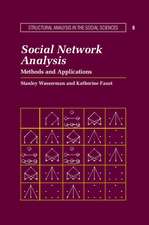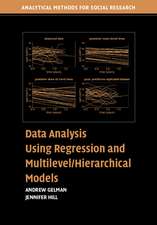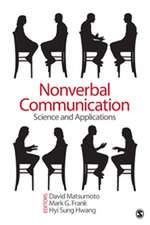Cross-Cultural Research Methods in Psychology: Culture and Psychology
Editat de David Matsumoto, Fons J. R. van de Vijveren Limba Engleză Paperback – 10 oct 2010
| Toate formatele și edițiile | Preț | Express |
|---|---|---|
| Paperback (1) | 329.32 lei 6-8 săpt. | |
| Cambridge University Press – 10 oct 2010 | 329.32 lei 6-8 săpt. | |
| Hardback (1) | 627.48 lei 6-8 săpt. | |
| Cambridge University Press – 10 oct 2010 | 627.48 lei 6-8 săpt. |
Din seria Culture and Psychology
-
 Preț: 207.43 lei
Preț: 207.43 lei -
 Preț: 284.78 lei
Preț: 284.78 lei -
 Preț: 331.66 lei
Preț: 331.66 lei -
 Preț: 316.28 lei
Preț: 316.28 lei - 11%
 Preț: 447.69 lei
Preț: 447.69 lei -
 Preț: 293.55 lei
Preț: 293.55 lei -
 Preț: 246.42 lei
Preț: 246.42 lei -
 Preț: 283.63 lei
Preț: 283.63 lei -
 Preț: 356.91 lei
Preț: 356.91 lei -
 Preț: 320.93 lei
Preț: 320.93 lei -
 Preț: 280.74 lei
Preț: 280.74 lei
Preț: 329.32 lei
Nou
Puncte Express: 494
Preț estimativ în valută:
63.02€ • 65.71$ • 52.38£
63.02€ • 65.71$ • 52.38£
Carte tipărită la comandă
Livrare economică 20 martie-03 aprilie
Preluare comenzi: 021 569.72.76
Specificații
ISBN-13: 9780521758420
ISBN-10: 0521758424
Pagini: 406
Ilustrații: 11 b/w illus. 18 tables
Dimensiuni: 150 x 229 x 23 mm
Greutate: 0.54 kg
Editura: Cambridge University Press
Colecția Cambridge University Press
Seria Culture and Psychology
Locul publicării:New York, United States
ISBN-10: 0521758424
Pagini: 406
Ilustrații: 11 b/w illus. 18 tables
Dimensiuni: 150 x 229 x 23 mm
Greutate: 0.54 kg
Editura: Cambridge University Press
Colecția Cambridge University Press
Seria Culture and Psychology
Locul publicării:New York, United States
Cuprins
1. Introduction to the methodological issues associated with cross-cultural research David Matsumoto and Fons J. R. van de Vijver; Part I. Conceptual Issues and Design: 2. Equivalence and bias: a review of concepts, models, and data analytic procedures Fons J. R. van de Vijver and Kwok Leung; 3. Translating and adapting tests for cross-cultural assessments Ronald K. Hambleton and April L. Zenisky; 4. Making scientific sense of cultural differences in psychological outcomes: unpackaging the magnum mysterium Michael H. Bond and Fons J. R. van de Vijver; 5. Sampling: the selection of cases for culturally comparative psychological research Klaus Boehnke, Petra Lietz, Margrit Schreier and Adalbert Wilhelm; 6. Survey response styles across cultures Timothy P. Johnson, Sharon Shavitt and Allyson L. Holbrook; Part II. Data Analysis and Interpretation: 7. Methods for investigating structural equivalence Ronald Fischer and Johnny R. J. Fontaine; 8. Evaluating test and survey items for bias across languages and cultures Stephen G. Sireci; 9. Effect sizes in cross-cultural research David Matsumoto, John J. Kim, Robert J. Grissom and Dale L. Dinnel; 10. Data-analytic approaches for investigating isomorphism between the individual-level and the cultural-level internal structure Johnny R. J. Fontaine and Ronald Fischer; 11. Multilevel modeling and cross-cultural research John B. Nezlek; 12. Cross-cultural meta-analysis Dianne A. van Hemert.
Recenzii
“Studies of culture are requisite to express the full scope of human psychology. However, the knowledge base of contemporary behavioral and social science almost entirely reflects Western (European and North American) origins. In response to this state of affairs, cultural study is on the ascendancy, and to ensure meaningful, appropriate, and practical cultural research, it is necessary that design, measurement, and analysis in cultural science begin on reliable and valid footing. This edited volume collects state-of-the-art, comprehensive, and informative chapters by leading authorities. Each chapter lucidly conveys in-depth coverage of the most important methodological topics in the field – equivalence and bias, translation, sampling, response style, data analysis, multilevel modeling, and even meta-analysis – and illuminates its subject matter with illustrations from cutting-edge research.”
– Marc H. Bornstein, Editor, Parenting: Science and Practice
“The why, where, who, what, and when involved in the complex dance between culture and psychological research invite many questions. But the how in this dance – selecting the right methods of inquiry – is absolutely necessary to help interpret what the dance means. Editors David Matsumoto and Fons van de Vijver have compiled a valuable book which will help guide the current generation of culture-oriented psychologists. As co-author of the first relatively comprehensive book in this area (Cross-Cultural Research Methods by Brislin, Lonner and Thorndike, 1973), I join many in welcoming this contribution that impressively updates the many advances in methods.”
– Walter J. Lonner, Founding and Special Issues Editor, Journal of Cross-Cultural Psychology
“This book responds wonderfully to a long-felt need: a full-length exploration of the broad range of distinctive methodological problems faced by those who wish to undertake cross-cultural studies of psychological issues. Problems are not just identified, a wealth of hands-on advice on how to manage them is also provided. The editors have assembled a panel of many of the best-known methodologists in the field and provided a structure that leads the reader gently toward more productive and thoughtful ways of doing research. This volume should find a place on every cultural researcher's bookshelf.”
– Peter B. Smith, University of Sussex
"....Those with the relevant background will appreciate these well-written essays, most of which offer concrete examples from the research literature that allow readers to see how to execute cross-cultural studies with whatever tools the authors describe. In sum, cross-cultural researchers who use quantitative methods will find the book useful.... Recommended...."
– B. J. Lovett, Elmira College, CHOICE
"...Readers can use this book in its entirety or just read individual chapters. It is a must read for cross-cultural researchers in psychology, and reading it would be a great way to build more knowledge and critical thinking skills for advanced doctoral students and early career professionals who are hoping to contribute to the cross-cultural psychology literature in the future. It would also be a useful tool for faculty members and researchers who direct a research team or who teach an advanced seminar in cross-cultural psychology."
–Dr. Yuki Okubo, Alliant International University-San Francisco campus, PsycCRITIQUES
– Marc H. Bornstein, Editor, Parenting: Science and Practice
“The why, where, who, what, and when involved in the complex dance between culture and psychological research invite many questions. But the how in this dance – selecting the right methods of inquiry – is absolutely necessary to help interpret what the dance means. Editors David Matsumoto and Fons van de Vijver have compiled a valuable book which will help guide the current generation of culture-oriented psychologists. As co-author of the first relatively comprehensive book in this area (Cross-Cultural Research Methods by Brislin, Lonner and Thorndike, 1973), I join many in welcoming this contribution that impressively updates the many advances in methods.”
– Walter J. Lonner, Founding and Special Issues Editor, Journal of Cross-Cultural Psychology
“This book responds wonderfully to a long-felt need: a full-length exploration of the broad range of distinctive methodological problems faced by those who wish to undertake cross-cultural studies of psychological issues. Problems are not just identified, a wealth of hands-on advice on how to manage them is also provided. The editors have assembled a panel of many of the best-known methodologists in the field and provided a structure that leads the reader gently toward more productive and thoughtful ways of doing research. This volume should find a place on every cultural researcher's bookshelf.”
– Peter B. Smith, University of Sussex
"....Those with the relevant background will appreciate these well-written essays, most of which offer concrete examples from the research literature that allow readers to see how to execute cross-cultural studies with whatever tools the authors describe. In sum, cross-cultural researchers who use quantitative methods will find the book useful.... Recommended...."
– B. J. Lovett, Elmira College, CHOICE
"...Readers can use this book in its entirety or just read individual chapters. It is a must read for cross-cultural researchers in psychology, and reading it would be a great way to build more knowledge and critical thinking skills for advanced doctoral students and early career professionals who are hoping to contribute to the cross-cultural psychology literature in the future. It would also be a useful tool for faculty members and researchers who direct a research team or who teach an advanced seminar in cross-cultural psychology."
–Dr. Yuki Okubo, Alliant International University-San Francisco campus, PsycCRITIQUES
Descriere
This book provides state-of-the-art knowledge about the methodological problems that need addressing for a researcher to conduct valid and reliable cross-cultural research.














